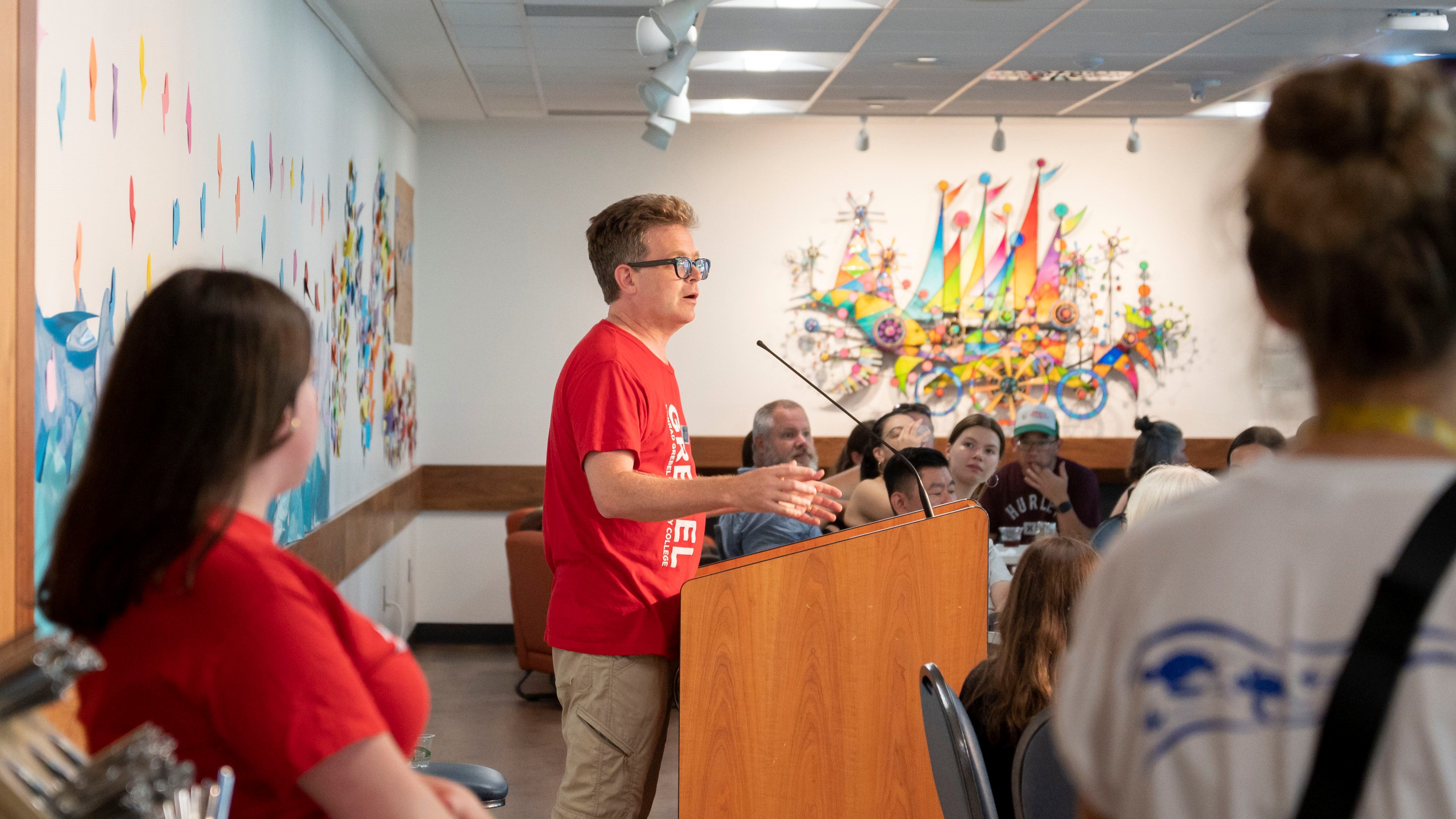Grebel’s Fall Bloom: Welcoming New Scholars to the Garden

The first week of September brought an atmosphere of excitement to Conrad Grebel University College as a new batch of Grebelites arrived at the residence, joined by their parents and greeted by enthusiastic upper-year students. A spirit of new possibilities could be felt in the air—a spirit that has been gracing Grebel’s doorstep for the last 60 years.
“Our returning students have demonstrated skill and enthusiasm for leadership as they welcomed new students during these first weeks,” said Chaplain Jessica Reesor Rempel. “New students are already finding ways to get involved and contribute to the Grebel community.” Grebel Orientation Week isn’t complete without the annual staff vs student volleyball game, with the staff putting up an epic fight this year, falling just short in the end. “A team that has been in a rebuilding phase for the past 30 or 40 years,” laughed President Marcus Shantz. Grebel students kept the fun going by serving their local community with a free car wash and building hygiene kits for Mennonite Central Committee. After a communal brunch to meet Grebel faculty, all students, staff, and faculty were then invited to spend the Saturday at Laurel Creek Conservation Area, soaking in the last bit of the summer sun with the All-College games, lawn games, hiking, and canoeing, followed by a picnic and campfire.

This fall, the Grebel residence is filled once again, home to 172 students, with 40 more living off campus who participate in Grebel life. Students hail from across Canada, as well as from the USA, United Kingdom, Barbados, Turkey, Vietnam, Philippines, UAE, and Hong Kong. About a quarter of students come from a Mennonite background, another half are Christian, and eight percent of students identify with another faith. Arts and Science students make up about 30 percent and 20 percent of Grebel residents respectively, with the rest of the student body representing a relatively equal spread of Engineering, Environment, Math, and Health faculties.
Grebel’s graduate programs also continue to welcome a wide range of highly motivated students to join one of two programs, a master’s degree in Peace and Conflict Studies (MPACS) or Theological Studies (MTS). With similar enrolment to last year, the MPACS program admitted 18 new students for a total of 36 students in the program, while the MTS program admitted 12 new students for a total of 29.
Undergraduate course enrolments currently stand at 1518, which is just under last year’s numbers. Grebel faculty teach undergraduate courses to University of Waterloo students in Music, Peace and Conflict Studies, Mennonite Studies, Religious Studies, and History. Students are already jumping into their university experience by joining music ensembles, attending brown bag lunches, and engaging in varied peace-related initiatives like Peace Week. "We are energized by the beginning of the new academic year and the arrival of students back on campus,” said Dean Troy Osborne. “Faculty anticipate a year filled with opportunities to grow and discover together with our students.”
As part of Grebel’s annual Opening Celebration, students, staff, and faculty visited the College’s new pollinator garden where they planted seeds for the Act of Community. To Grebelites, this garden represents commitment and community. Last year, Grebel set a goal to reduce greenhouse gas emissions 35 percent by 2030. To visibly demonstrate this goal, Grebel created a garden filled with plants native to North America that create habitat for pollinating insects.

“Gardens are hard work,” said President Shantz as part of his welcome address. “A garden is boring if it only has one kind of plant, and a college is boring if everyone thinks the same, acts the same, or studies the same things.” He explained which kinds of flowers make an impressive, flourishing garden, and the reality is that there is no one answer. “A truly impressive garden is one that encompasses many kinds of plants—some that flourish right away, some that take longer. Some that grow better when planted close to certain other plants, and some that need extra space. Some plants fill the practical roles of producing food while others thrive in doing the more subtle work, like feeding insects or putting nitrogen back into the soil.”
“What sort of plant are you?” Shantz asked the crowd of more than 200 Grebel students. “Whoever you are, we want you to know that you belong in this garden.”
This September marks the 60th year of Grebel inviting different plants to bloom together in its garden, a week of welcome that will continue to mark the start of a promising school year.
By Farhan Saeed